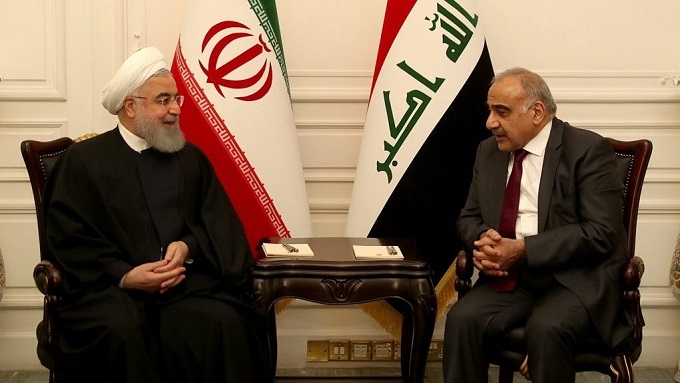



Iraqi Prime Minister Adel Abdul Mahdi (R) meets Iranian President Hassan Rouhani in Baghdad, March 11. (Reuters)
President Rouhani’s three-day trip at the invitation of his Iraqi counterpart Barham Salih is the first visit of an Iranian president to Iraq since 2013. Taking place in the context of Iraq’s efforts to rebuild the country after the war against the self-proclaimed Islamic State (IS) and Iran struggling to resist against comprehensive US sanctions, the visit clearly shows the desire of the two neighbouring countries to strengthen cooperation to serve economic development goals and ensure common security in the region.
After officially withdrawing from the Iranian nuclear deal in May 2018, the US re-imposed and even strengthened sanctions against Tehran, aimed at the key areas of Iran’s economy such as oil, banking and shipping. In that context, Tehran strives to expand economic cooperation and seek new partnerships, but has not ignored the goal of facilitating collaboration with its neighbour, Iraq. The efforts to cope with pressure from US sanctions have helped Tehran to constantly increase its political and economic influence along the "control corridor” from Iran through Iraq, Syria and Lebanon to the Mediterranean.
With Iraq, while the battle against terrorism has temporarily eased and the IS forces have already been repelled from the territory, the task of rebuilding the country after the conflict is no less arduous. In an effort to find resources, neighbour Iran is an address that Iraq cannot ignore. Therefore, the main theme of the meetings between Iranian President Rouhani and his Iraqi counterpart Salih and Prime Minister Adil Abdul-Mahdi will be to strengthen economic relations between the two countries, which will both serve the national reconstruction in Iraq and accelerate bilateral trade to help Iran cope with sanctions.
The solid foundation for the cooperation prospects between the two countries is Iran’s support for the anti-terrorism efforts, especially the recent fight to eliminate the IS in Iraq. Iran has no official military presence in Iraq, but the Shiite Muslim militia groups in Iraq are still thought to receive support from Tehran. Ahead of the visit, President Rouhani did not hide this support, stating that Iranian forces and Tehran-backed militia groups played an important role in defeating the IS in both Iraq and Syria. But for Iran’s support, the Baghdad government and the Kurdish region in Iraq could not have fulfilled their mission of expelling terrorists, and the IS would have dominated the whole region.
Together with its "contributions” to the anti-IS fight, Tehran is also said to have received support from a number of powerful forces in the Iraqi parliament, who have still worked hard to pass a bill that forces foreign countries to withdraw their troops from Iraq. They also criticised harshly the US’s decision to leave its forces in Iraq to "watch Iran”. It can be seen that through allied politicians and paramilitary groups, Iran still emerges as one of the most influential forces in Iraq.
Iraq is currently still dependent on Iran’s energy supply. In order to serve the national power network, Iraq continues to buy electricity and natural gas from Iran, although Baghdad is not entitled to "immunity rights” regarding sanctions against Iran. Iraq and Iran have targeted to raise bilateral trade revenues from the current US$12 billion to US$20 billion soon. These priority targets are overshadowing the goals of sanctions which aim to narrow Iran’s "benefit map”, including the removal of Baghdad from the network of purchasers of Iran’s gas.
With a shared borderline of nearly 1,500 km, alongside many binding political and economic interests, Iran and Iraq both have to prioritise close neighbourly relations. During his trip to Baghdad ahead of President Rouhani’s visit, the Iranian Foreign Minister affirmed that Iran and Iraq are inseparable neighbours.
Source: NDO